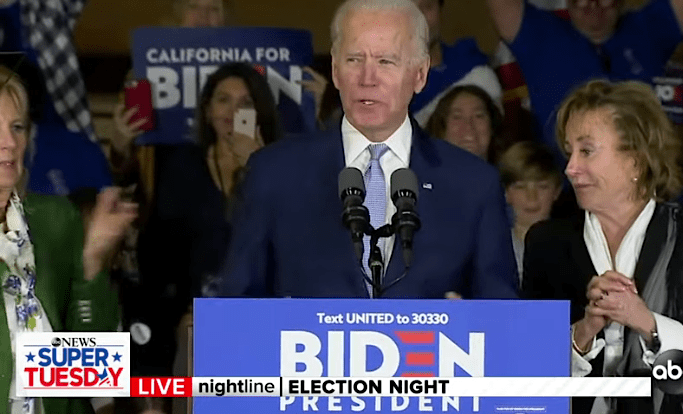Super Tuesday Was a Real ‘Horse Race’ After All
By • March 4, 2020 0 718

What’s Left After Biden’s Stunning Super Tuesday Wins?
Super Tuesday — March 3, when 14 states held their Democratic primary elections for President of the United States — actually resembled in part the “horse race” that the media loves to depict and discuss. For hours after the polls closed, no one could clearly say which of the top two candidates, Bernie Sanders or Joe Biden, would win the most Super Tuesday delegates. Throughout the late night on Tuesday, Biden and Sanders traded leads in Maine, Texas and Colorado. And by noon, Wednesday, two states were still not declared: Maine and California.
In the end, there were big surprises: Sanders won Colorado unexpectedly and lost Minnesota. Most surprising, not only did Biden win Massachusetts but Sanders came in second while Massachusetts’s Sen. Elizabeth Warren came in third even after the Boston Globe (that urged her not to run a year ago) endorsed her in February. But perhaps the biggest surprise for some was that by night’s end, Biden had won Texas. For hours, Texas looked like it would go to Sanders.
By early Wednesday, Biden had officially won the most delegates: 453 to Sanders’s 373. But California could change that. By week’s end, Sanders could hold the most delegates, as votes are still being counted in California.
The Golden State seemed to be heading towards a firm Sanders win. But the big question remained: how many delegates would Sanders get? It was hard to estimate since California is an “open” state – meaning that there are no restrictions on party members voting in the other’s primary. With 419 pledged delegates to be decided, a big Sanders win could see him taking the delegate lead from Biden — at least until the next primaries on March 10, 17 and 24. Many political analysts credited Sanders’s win in California with early voting there that began two weeks before Super Tuesday. But no one knows how many Sanders voters would have switched their votes to Biden after his big win in South Carolina Feb. 29. That win, with key, high-profile endorsements, drove the suddenly growing momentum of Biden into Super Tuesday.
Stumbling mightily Tuesday, former New York City mayor Michael Bloomberg has some power left. After spending some $500 million on ads and building a campaign infrastructure in more than 40 states, the billionaire only got one win in American Samoa. But he won delegates in Texas, Arkansas, Tennessee, Colorado, Utah and California. He bested Warren for third place in national polls. He also could be said to have taken away votes from Biden in Colorado and California where Sanders won.
By Wednesday morning, Bloomberg announced he was ending his candidacy. But his power could now be seen as growing behind-the-stage in the Biden campaign. With significant money and more importantly infrastructure support, it seems likely Bloomberg will have serious input into the Biden campaign, including its rhetoric and issue priorities. It is also possible Bloomberg behind-the-scenes could keep Biden from going too far left in the general election.
Of course, there are big questions left as the race narrows. How will Sanders supporters react to the possibility, even likelihood, that Biden might go more centrist before or after he wins the nomination? Who will Biden choose as vice president to shore up that left base (as well as age concerns)? What will Biden do to capture more of the so-called Latino vote that Sanders seemed to have won over better in Colorado, Nevada and California? While that vote could be seen as being driven more by Latino youths interests than particular minority identity-group issues, their vote does bring the topic of immigration more to the fore. Will Biden go more left on immigration and risk turning off prospective switch-over Republican voters?
Washingtonians, watching the shifting horse race at the National Press Club Tuesday night, quietly conversed about these topics as the Super Tuesday votes played out. But even so, the audience there seemed surprisingly stoic. Outside of a constant murmur of comments, they were relatively non-exuberant.
Still, the nomination race is not over by far, despite the media’s usual proclamation of a winner (at this moment, Biden). By week’s end, it could well be that Biden has the clear momentum to win the next primaries. But once California votes and delegates are known — likely by March 6 — it seems likely that Sanders will have more delegates.
The winner needs at least 1,991 delegates to win the nomination outright. If no candidate has that number of delegates by July 13-16, when the Democrats meet in Milwaukee, they will have to have a “brokered” convention. In a new procedure established since the 2016 election, if after all the Democratic state delegates cast their first ballots and they still don’t have a candidate with the threshold number, then super delegates chosen from and by party leaders in every state will then be allowed to lobby and to vote.
It remains unclear how Sanders supporters will react.

